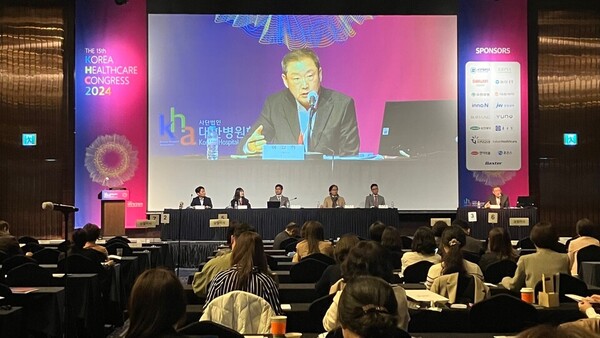Following Somzz, the first digital treatment device (DTx) in Korea, WELT-I has won approval from the Ministry of Food and Drug Safety and has begun to be prescribed to patients. Still, experts point out that expanding DTx prescriptions remains challenging.

Better Therapeutics, which has been approved by the U.S. Food and Drug Administration (FDA) as a DTx for type 2 diabetes, recently announced plans to delist from the Nasdaq and is reportedly considering selling off its assets. This raises concerns about difficulties building an ecosystem based on a virtuous cycle that leads to revenue generation.
That was a consensus among field experts who participated in a forum titled “Digital Therapeutic Devices’ Entry into the System: Opportunity or Crisis?” during the 15th Korea Healthcare Congress (KHC 2024) organized by the Korean Hospital Association (KHA) at the Grand InterContinental Seoul Parnas on Thursday.
"DTx is prescribed to patients, but the pace is not fast enough," said Kyung Dae-sung, senior vice president of strategic marketing at Hanmi Pharm. "Companies will make bold investment decisions only when the structure of developing DTx, prescribing them, and making profits creates a virtuous cycle, but the pace is still slow."
There is an interest in DTx and a willingness to prescribe it. Still, it is doubtful that it can be put into the EMR system platform and prescribed like other drugs, Kyung said, adding that the industry will invest only after the ecosystem is built. A couple of successful DTx models came out.
Others said that collaboration with medical institutions is also important for the DTx industry to expand its prescriptions in Korea and compete in the global market.
HAII Therapeutics CEO Kim Jin-woo said, "We participated in a project to develop a treatment for late-stage language and cognitive disorders in stroke patients and conduct clinical trials in Korea and abroad. We could not have made the challenge without the help of 52 hospital-level rehabilitation medical centers, which helped us conduct clinical trials and demonstrate the product."
Kim emphasized that government investment should facilitate collaboration with domestic medical institutions. Noting that DTx services should eventually target the global market, he said, “To do so, we need to move forward in a direction that can play a role with domestic medical organizations."
The system must also be improved so patient data can be linked to EMRs to minimize administrative procedures for doctors to increase prescription access.
"For DTx to be activated, hospitals need to prescribe it actively," said Professor Shin Jae-yong of the Department of Preventive Medicine at Yonsei University College of Medicine. "For this purpose, hospitals must ensure that patient data goes through the EMR so that doctors can easily prescribe and use DTx."
Professor Shin continued, “It took us two years to get our DTx product into the EMR. It took us a long time to resolve numerous administrative procedures and build a system to receive external information in real time. From April, it will be possible to prescribe DTx not only for high-level general hospitals but also for hospitals and clinics."
The government emphasized the importance of proving “effectiveness” to be competitive domestically and globally.
"There are many products aimed at improving insomnia globally, but there are no products for cognitive therapy or dementia patients anywhere in the world," said Han Young-min, an official at the Digital Health Regulatory Support Division at the Ministry of Food and Drug Safety. “We are conducting clinical trials first and plan to approve them as early as this year or next. If these products are approved for the first time globally, Korea will receive attention."
Han pointed out that to go global, each country's regulator is at a different level, but an important perspective for regulators is validation.
"You will be able to survive in the global market depending on how you handle these points," he said. To prepare for global competitiveness, it is necessary to consider validating DTx throughout the entire lifecycle.
Related articles
- Regulatory roadblocks impede growth of digital therapeutics industry in Korea
- Yongin Severance Hospital starts prescribing digital insomnia therapy Somzz
- Drug regulator increases DTx budget by ₩2.3 billion
- YUHS unveils innovative DTx integration platform, revolutionizing personalized care
- DTx and AI treatments to get insurance benefits
- AimMed challenges to develop DTx for Galaxy Watch
- Number of DTx license applications since April remains ‘zero’
- Korea approves 2 more DTx for vision improvement, respiratory rehabilitation
- Handok and Welt's insomnia digital therapeutic device marks 1st prescription in Korea
- Korea's 1st DTx Somzz proves effective to treat chronic insomina: study
- Hospital group head calls for increasing medical fees, easing workforce shortage
- [BIO KOREA 2025] Experts urge better infra and pricing for digital therapeutics

